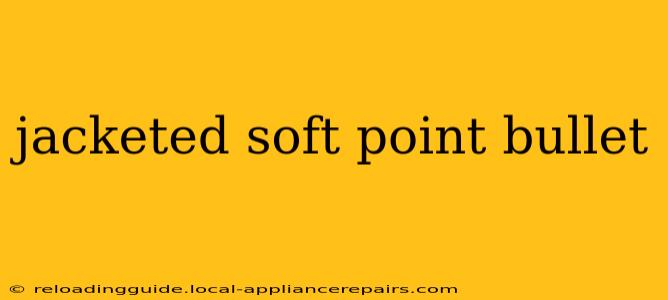The world of ammunition is complex, with a vast array of bullet designs catering to different needs and applications. Understanding the nuances of each type is crucial for responsible firearm ownership and accurate shooting. This in-depth exploration focuses on jacketed soft point (JSP) bullets, examining their construction, performance characteristics, and suitability for various hunting and shooting scenarios.
Understanding Jacketed Soft Point Bullet Construction
A jacketed soft point bullet combines the best features of full metal jacket (FMJ) and soft point bullets. It features a lead core, providing excellent weight retention and energy transfer upon impact. This core is encased in a metal jacket, typically copper or gilding metal, which protects the bullet from deformation during feeding and enhances accuracy. The key differentiator is the exposed lead tip, which is intentionally left unjacketed. This exposed lead tip is what facilitates controlled expansion and energy transfer upon impact.
Key Components and Their Roles:
- Lead Core: Provides the mass and weight necessary for penetration and energy transfer. The softness of the lead contributes to expansion.
- Metal Jacket: Enhances the bullet's aerodynamic stability, protects the lead core during feeding, and provides consistent performance.
- Exposed Lead Tip: The critical element enabling controlled expansion. The softer lead deforms predictably on impact, increasing the bullet's diameter and creating a larger wound cavity.
Performance Characteristics of JSP Bullets
Jacketed soft point bullets strike a balance between penetration and expansion, making them versatile for a wide range of applications. Their performance is influenced by several factors, including:
- Caliber: Larger calibers generally deliver more energy and deeper penetration.
- Bullet Weight: Heavier bullets have more momentum and penetration, while lighter bullets tend to expand more readily.
- Velocity: Higher velocities contribute to greater penetration and expansion, but excessive velocity can lead to fragmentation.
- Game Size and Type: The choice of JSP bullet should be tailored to the intended game animal, considering its size, build, and hide thickness.
Advantages of JSP Bullets:
- Controlled Expansion: JSPs are designed for reliable expansion, maximizing energy transfer to the target.
- Good Penetration: The metal jacket ensures sufficient penetration, even through bone.
- Accuracy: The jacketed construction contributes to consistent accuracy and predictable flight paths.
- Versatility: Suitable for a wide range of game animals and hunting situations.
Disadvantages of JSP Bullets:
- Not Ideal for Extremely Hard Targets: While providing good penetration, they may not perform optimally against extremely hard surfaces.
- Potential for Over-Expansion: At very high velocities, over-expansion can occur, leading to reduced penetration.
Applications of Jacketed Soft Point Bullets
JSP bullets are a popular choice for hunters and shooters alike due to their versatility. They are particularly well-suited for:
- Big Game Hunting: Their controlled expansion and good penetration make them ideal for deer, elk, and other large game animals.
- Medium Game Hunting: Equally effective on medium-sized game such as antelope, hogs, and coyotes.
- Target Shooting: While not as common for target shooting as FMJ, their accuracy makes them suitable for certain applications.
Choosing the Right Jacketed Soft Point Bullet
Selecting the appropriate JSP bullet requires considering various factors, including the caliber of your firearm, the intended game animal, and the specific hunting conditions. Consulting with experienced hunters or firearm professionals can provide valuable guidance in making an informed decision.
Disclaimer: This information is for educational purposes only. Always handle firearms safely and responsibly. Consult with relevant authorities and experts before engaging in any firearm-related activities.

